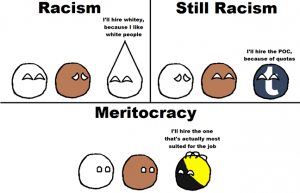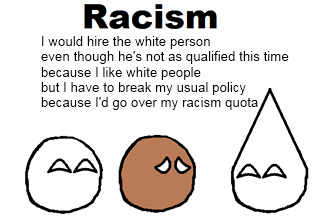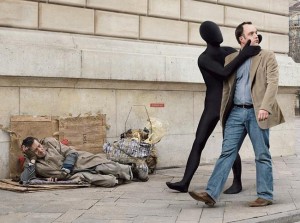
Why This Meme is Incorrect
tl;dr ~ The top-left already exists, has for generations, and is inexorably ongoing for the time-being. We can’t have the bottom because the top-left exists. So the choice we are left with for the time-being is (A) to have just the top-left or (B) to have both the top-left plus the top-right together. With option B, we can hopefully move towards the ideal of fairness arguably reflected by the bottom.
Feel free to jump down and post your comment now.
Longer Explanation
The rules of monopoly might be fair, but not after someone has already cheated. It’s particularly unfair for those benefiting from the initial cheating to want everyone to play by the rules after the cheating in the name of fairness.
A meritocracy would arguably be great but we don’t get there by ignoring generations of systemic ongoing racism to merely oppose the ensuing programs of counter-racism that can be an attempt to help reset the playing board to move towards a fairer more meritocratic system.
It’s a fallacy to apply an opinion about the specifics of what would go on in an ideal context with those same specifics existing not in isolation but as small reforms to massive utterly non-meritocratic systems. In other words, it’s unfair to consider the frame in the top-right in isolation as opposed to considering the top-right as an optional addition to the pretense of the top-left, which inexorably exists at the same time with or without the top-right. The reason the top-left, in contrast, is in context uniquely unfair is it exists without the top-right–its existence being the reason why we can’t snap our fingers and magically have the racism-free idealism arguably reflected in the bottom.
The meme is incorrect because it mistakenly applies a simplistic philosophical idealism in a fallaciously specific and practical matter.
In short, a world without racism would of course be great. But we can’t choose very specific reforms under the delusion that we live in a post-racism society.
A black person is more than twice as likely to be killed by police in the USA simply by being black.1, 2 Black people are not genetically predisposed to committing crime or being killed by police. Rather, those unequal statistics are caused by generations of ongoing systemic racism.
While Hispanic and Black people make up about 30 percent of the United States’ population, they account for 60 percent of those imprisoned.3 They are predominately charged with non-violent crimes such as marijuana possession. Again, Hispanic and Black people are not genetically predisposed to committing more crime. The racial inequality is caused by racism. Among other factors, two people being charged with the same crime with the same evidence will get very different verdicts and sentences based on their skin color and similar prejudices.
Simply by being born with darker skin one is statistically disadvantaged, and it’s getting worse.
Black Americans have and receive less wealth and income than white people, and the gap is increasing. Society is becoming less meritocratic and more racist against Black people. The wealth of White households was 13 times the median wealth of Black households in 2013, compared with eight times the wealth in 2010.4
In less formal experiments, the incredible persistent racism in our society is even more poignantly demonstrated, such as in the experiment by ABC’s “What Would You Do” involving pretend bicycle thieves.
In scientifically repeated studies involving fictional people, identical résumés received significantly less calls if just the name was changed to sound more Black. The same was repeated in variation with the same results, this new time not by changing the name but just by including a picture of the pretend candidate.
In the real life version of that study, it’s not the victim’s own fault because how do these disadvantaged babies choose the hue of their own skin? Rather it’s the foolish archaic leftovers of generations past.
It’s not black and white, no pun intended. And it’s not us vs. them. Science continues to show that stereotypes are ingrained within us from culture passed generation to generation. It’s not White Americans that are racist against Black and Hispanic Americans; it’s all Americans. Science shows we strongly stereotype often without realizing it–much like optical illusions. Black people apply the same negative stereotypes against other Black people without even realizing it. Scientific studies demonstrate this over and over again.5
The longer the inequality of results caused by the inequality of opportunity continue, the more these dangerous stereotypes reproduce and strengthen themselves.
I’m not saying that any particular implementation of simplistic quotas are the answer. I’m not saying that any particular allegedly counter-racist policy cannot happen to be counter-productive and thus worsen the gap. Those are complicated and highly practical matters that have to be addressed in detail one-by-one with much deference to respective experts. I’m just saying it’s dangerously incorrect to stick our heads in the sand and make decisions as if we already lived in anything close to a meritocracy or post-racism society.
In my anecdotal experience, the people who agree with the messaging of the meme that started this are sometimes–but not necessarily–ignorant of or in denial of the cited facts I listed above. That ignorance and denial can be very dangerous. It’s the fuel of the neo-Nazi movement (which entails people getting shot). That doesn’t mean everyone who feels that way is a neo-Nazi; that would be the same dangerous black-and-white thinking that makes neo-Nazism dangerous. We need to be realistic not just idealistic about these things. It’s dangerous not to be. We need to work together, not in opposition. We seem so far apart at times but at root we are so close with our fates intertwined.
The general ideal is very agreeable: We want to live in a fair society without racism. But we cannot ignore the facts or make up our own like some Trump tweet.(source: Fox News)
What do you think? Please leave a comment below.
Also, for your viewing pleasure, here is my correction of the meme:

References
1 – 13.2% of the population in the USA is African American, via http://quickfacts.census.gov/qfd/states/00000.html
2 – 29.8% of people killed by police in the USA are African American, via http://killedbypolice.net/
3 – https://www.americanprogress.org/issues/race/news/2012/03/13/11351/the-top-10-most-startling-facts-about-people-of-color-and-criminal-justice-in-the-united-states/
4 – http://www.pewresearch.org/fact-tank/2014/12/12/racial-wealth-gaps-great-recession/
5 – https://www.psychologytoday.com/blog/mind-the-gap/201110/prime-and-prejudice-why-we-are-all-little-bit-racist-0
